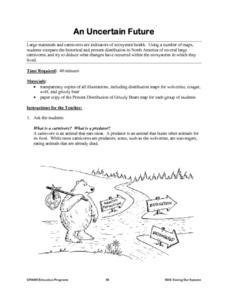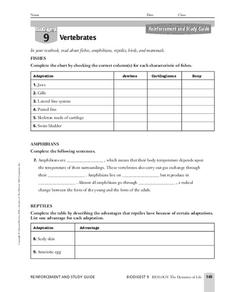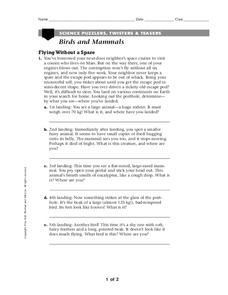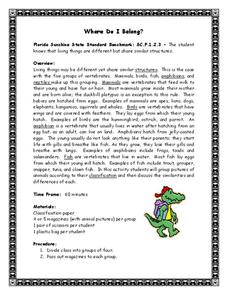Curated OER
Ocean Life: A Heavy Subject
Second graders examine The Learning Page Fact Files about ocean life and categorize the data by weight and group. They distinguish between fish, mammals, and invertebrates and which weigh the most and the least. Students record their...
Curated OER
An Uncertain Future
Students study the distribution of large mammals and carnivores in an ecosystem. Using maps and historical data, they examine areas for these animals such as refuges, untouched forests, prairies and grasslands. Students determine actions...
Curated OER
Animal Classification
Second graders identify characteristics of and group animals by the five categories of vertebrates.
Curated OER
Technology Squares: Mammals
Review basic vocabulary related to mammals. This short quiz game allows students to test their skills and understanding of scientific vocabulary. This game is appropriate for grades 5-7 and covers very basic concepts.
Curated OER
A Tooth for a Tooth
Learners classify mammals as carnivores or herbivores. They look at a set of pictures of animal skulls, observing the shape and size of the teeth, and identify herbivores and carnivores.
Curated OER
Sunken Millions Animals
This PowerPoint includes a game with ocean graphics in which two teams answer increasingly difficult questions about animals. Topics covered include plant and animal cells, animal adaptation, and similarities and differences between...
Curated OER
Plants and Animals
Students find common needs between plants and animals. In this plants and animals lesson students compare that both plants and animals need food and water. They also find the differences between plant and animal needs.
Curated OER
Mammals of Fields, Meadows, and Hedgerows
In this mammals worksheet, students research the internet to find information and answer short answer questions about mammals of fields, meadows, and hedgerows. Students complete 12 questions.
Curated OER
Classification of Intertidal Organisma
Students categorize animals. In this animal classification lesson plan, students group animals by their characteristics. Students break into groups and work together to classify the animals. Students fill out a graphic organizer with...
Texas Instruments
Can You Breathe Like a Pinniped?
Young learners compare the breathing patterns of different animals in this pinniped lesson. They examine the breathing pattern of California sea lions and northern elephant seals. Pupils collect, compare and analyze data concerning...
Curated OER
Get to Know: Mammals
Students discover the mammals in their community. In this animal lesson, students survey their school grounds for signs of mammals. Students examine tracks, droppings, and other signs of wildlife to learn more about the animals and their...
Curated OER
Mammal Facts and Myths
Students write a report. In this mammals lesson, students learn about various mammals such as whales, beavers, bats and echidnas. Students make a diagram, write a report, brainstorm a list of myths and make a model animal.
Curated OER
Get- To Know Mammals
Students take a field trip and record information about mammals. In this mammals instructional activity, students hunt for tracks, waste, or other evidence that a mammal exists in this habitat. Students complete a worksheet on the...
Curated OER
Identifying Mammals
Students investigate mammals. In this biology lesson, students use various websites to investigate mammals and their body parts. Students take notes the websites.
Curated OER
Habitat Awareness
Second graders build a habitat. In this wildlife lesson, 2nd graders work in groups to build a mammals habitat. They share their habitat with the class.
Curated OER
Vertebrates
In this vertebrate activity, learners review the different adaptations for the 5 groups of vertebrates: birds, mammals, reptiles, amphibians, and fishes. This activity has 12 matching, 1 fill in the blank, and 7 short answer questions.
Curated OER
Life Has A History
In this biology worksheet, students identify and match various classes of species found today. Then they explain why biodiversity exists today on earth and define evolution. Students also describe who a paleontologist is and what they do.
Curated OER
Name Match
For this name match worksheet, students match up fourteen different types of mammals with their formal names by drawing a line from one to the other.
Curated OER
Internet Quests: Mammals
In this science and technology worksheet, students use reference books or Internet searches to find facts about the blue whale, beaver, bat and echidna. Students answer 20 questions about each mammal, fill out charts and illustrate facts.
Curated OER
Birds and Mammals
In this science worksheet, students create details given an imaginary story to reinforce the topics of mammals and birds. The second page has more puzzles for them to do.
Curated OER
What is the Evidence for Evolution?
Learners identify one object that would tell the story of their lives. In groups, they determine what can and cannot be told from objects left behind. After watching a video, they compare and contrast chicken bones to human bones. To...
Curated OER
Where Do I Belong?
Fourth graders work in groups. They are given magazines. Students cut pictures of five mamals, five birds, five reptiles, five amphibians, and five fish. They place the pictures in a plastic bag. Students switch bags. They are explained...
Curated OER
Mammal Teeth and Skulls-Adaptations and Identification
Student study the differentiation of teeth and skull adaptations in mammals in general and 14 common terrestrial mammals. They explore more about these mammals, their natural history, their adaptations and their identification through an...
Curated OER
United States Identifier
Fifth graders examine and research a major region of the Unites States in groups of four. In addition, they locate the states, capitals, mammals and two bodies of water or mountain ranges found within their region. After the research,...

























